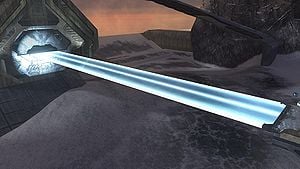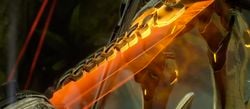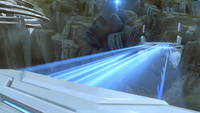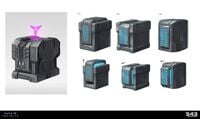Hard light
From Halopedia, the Halo wiki
- Cortana: "I'm showing a lot of photonic activity. The excited photons have displaced the air around the light path."
- John-117: "Which means?"
- Cortana: "Which means that the light has become coherent. Solid."
- — Exchange between John-117 and Cortana regarding a light bridge on Installation 04[1]
Hard light, alternatively spelled hard-light or hardlight[2] and more formally identified as a boson-photon field,[3] is a Forerunner technology that allows light to be transformed into a solid state, capable of bearing weight and performing a variety of tasks. This involves an as-yet unexplained interplay between coherent, high-energy light and gas particles, such as air.
Applications[edit]
Basic[edit]
Hard light was used extensively by the Forerunners for a great variety of purposes. Forerunner control panels and interfaces are almost always made entirely of hard light, and can react to the touch of a Forerunner or human despite their utter lack of mechanical components. Light bridges are another basic application of hard light; these bridges are strong enough to bear the load of heavy objects such as a Scorpion tank, yet can be switched on or off as easily as a normal beam of light. Some of the larger conventional bridges constructed by the Forerunners also feature support cables made of hard light.[4] Hard light is also used in the locking mechanisms of Forerunner doors.[5]
As structural elements[edit]
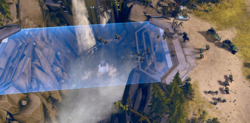
The most prominent use of hard light is perhaps also its most inconspicuous one; although this is not immediately obvious, hard light construction actually comprises a significant portion of Forerunner architecture. Through the use of highly sophisticated holographic projection technology, hard light can be crafted to be entirely indistinguishable from physical construction such as metal and can form very complex shapes.[6][7] As such, hard light is commonly used in the composition of Forerunner structures and ships, either for structural support,[8] aesthetic purposes,[9] as a covering for mechanical and technological mechanisms, or to form internal divisions and compartments; this allows a Forerunner ship or structure to reconfigure its layout, furnishings or decoration at will.[10] Despite its versatility, hard light construction is susceptible to power failures and as such, the most important supporting structures have to be made of actual matter.
The Halo installations make use of hard light in their firing mechanisms,[11] in addition to using hard light as a protective structural reinforcement to stabilize and protect the rings against tidal and gravitational forces from other objects.[12] Although many Forerunner structures project a hard light decorative shell over the structural support elements of the building, almost all buildings seen on the Halo installations or the Ark lack this covering; the Forerunners did not implement such decoration on the Halos' structures, as they were meant to be purely functional.[13] However, the structures on the Halo rings still employ hard light construction for practical purposes.[6] Additionally, any structures that possess hard light decor only activated in the presence of Forerunners;[9] however, due to their status as Reclaimers, the presence of humans will also activate hard-light decoration in certain structures, as seen in the Menachite portal complex.[14]
Although they can be crafted to be extremely resilient, hard light constructs are not indestructible. Aside from disabling them by deactivating or destroying the power source, hard light constructs can break up upon suffering heavy damage. For example, Installation 07's central hard light hub and spokes connecting to the ring were destroyed under the stress of collision with a planet. The stress of the hard light structures pressing against the face of the planet caused the spokes to first stretch out, before fragmenting and abruptly turning into curling beams of intense, blue-violet radiation.[15]
Forerunner upgrade seeds are able to use hard light to reinforce construction of non-Forerunner origin, such as starship hulls. The Ace of Spades received an upgrade seed that reinforced its hull by hard light bonding.[8]
In military technology[edit]
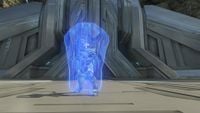
The Forerunners also used hard light technology to create protective personal shields, such as the Z-90 Photonic Coalescence Emitter/Aegis as it is known by the UNSC, more commonly known as the "hardlight shield," which could be deployed in the battlefield by fighting units like Promethean Knights. After encountering such technology in 2557, UNSC forces were able to adapt these shields for use by Spartan supersoldiers.[2] While highly resilient, these shields are not impervious to damage. This is believed to be because of the module's inability to propagate wide-range power generation.[16]
Promethean units are also known to incorporate hard light technology into their weaponry and even personal design. For close-quarters combat, Promethean Knights utilize hardlight blades to dispatch opponents. The Z-250 Lightrifle and Z-130 Suppressor are among the known infantry weapons to utilize hard light projectiles. For offensive purposes, they create solid projectiles that can be fired like conventional bullets or plasma bolts. Some units have presumably decorative hard light architecture, notably the fins on the back of the Knight Battlewagon.[17] Hard light was also used as a form of connective mechanism in the limbs of a war sphinx.[18] Forerunner design seeds also made use of hard light. When activated, the rotating pillars of the machine would emit "scaffolding" of hard light that would fabricate a machine or ship using raw materials obtained on-site. During the Forerunner-Flood war, the Forerunners experimented with volatile derivations of hard light, with similar effects to the blamite; those experiments resulted in a Suppressor variant called "Razor's Edge".[19]
To an unknown extent, the Covenant has made use of hardlight technology in a form of portable energy shielding. At some point, the Office of Naval Intelligence came into possession of a number of these devices and utilized them for an unknown purpose. The Covenant's application of this technology is known to be inferior to that of the Prometheans of Requiem, however.[16]
Ancient humanity and Ancient San'Shyuum was also known to use hardlight weapons similar to those of the Forerunners.[20][21]
Trivia[edit]
- According to the Minister of Discovery in Wages of Sin, hard light was one of the several Forerunner technologies the Covenant never successfully reverse-engineered.[5] However, the San'Shyuum Prelate Tem'Bhetek sports a hard light shield gauntlet in Halo: Shadow of Intent.[22] It is possible that the device was of Forerunner origin, rather than having been manufactured by the Covenant. Alternatively, the Minister of Discovery may not have been informed of the technology incorporated into the Prelate's armor. Halo Waypoint further claims that the Covenant developed technologies to control and utilize hard light from the analysis of Forerunner technologies.[23]
- There are real-world scientific efforts to manipulate light to behave as a solid surface.[24]
Gallery[edit]
A hard light bridge on Genesis.
Prelate Tem'Bhetek's hardlight shield emanating from his gauntlet.
Concept art for Halo Infinite of a Forerunner crate containing hardlight ammunition.
List of appearances[edit]
- Halo: Combat Evolved (First appearance)
- Halo: The Flood
- Halo: First Strike
- Halo Graphic Novel
- Halo 3
- Halo Wars
- Halo: Blood Line
- Halo: Evolutions - Essential Tales of the Halo Universe
- Wages of Sin (First identified as "hard light")
- Halo: Cryptum
- Halo: Combat Evolved Anniversary
- Halo: Primordium
- Halo 4
- Halo: Spartan Assault
- Halo: Spartan Strike
- Halo 5: Guardians
- Halo: Shadow of Intent
- Halo Wars 2
- Halo: Retribution
- Halo: Legacy of Onyx (Mentioned only)
- Halo: Renegades
- Halo: Point of Light
- Halo: Divine Wind
- Halo Infinite
- Halo: Hippocratica
- Halo: The Television Series Season Two
- Halo: Epitaph
Sources[edit]
- ^ Halo: The Flood, Chapter 3, pages 84-85 (2003 paperback); pages 95-96 (2010 paperback)
- ^ Jump up to: a b Halo 4 Official Site: GAMEPLAY
- ^ Mega Bloks, Special Report: ONI REAP-X
- ^ Halo: Combat Evolved, campaign level Assault on the Control Room
- ^ Jump up to: a b Halo: Evolutions - Essential Tales of the Halo Universe Volume II, "Wages of Sin", page 291
- ^ Jump up to: a b Halo: Primordium, pages 116, 201, 269
- ^ Halo 4
- ^ Jump up to: a b Halo: Renegades, Chapter ??
- ^ Jump up to: a b Halo: Cryptum, page 242
- ^ Halo: Cryptum, page 124
- ^ Halo: Cryptum, pages 307, 310
- ^ Halo: Cryptum, page 311
- ^ Halo: Cryptum, page 319
- ^ Halo: First Strike, page 143
- ^ Halo: Primordium, page 334-335
- ^ Jump up to: a b ```Halo 4: The Essential Visual Guide`````, page 137``
- ^ Halo Waypoint: Halo 4 Interactive Guide
- ^ Halo: Cryptum, pages 93, and 194
- ^ Halo 5: Guardians, Razor's Edge description
- ^ Halo: Cryptum, page 164
- ^ Halo: Cryptum, page 112
- ^ Halo: Shadow of Intent, pages 51, 53, 55 (Google Play edition)
- ^ Halo Waypoint: Covenant
- ^ CNN: Scientists create light-matter like Darth Vader's lightsaber
| ||||||||

